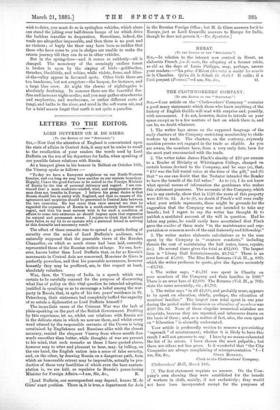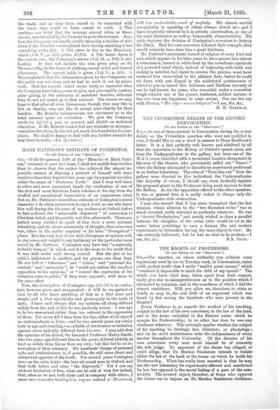THE CLOTHWORKERS' COMPANY.
r To THE EDITOR OF THE SPECTATOR:1 Sia,—Your article on the " Clothworkers' Company" contains a good many statements which those who know anything of the history of English Guilds will read with surprise and, possibly, with amusement. I do not, however, desire to intrude on your space except as to a few matters of fact on which there is, and can be, no doubt whatever.
1. The writer lays stress on the supposed language of the early charters of the Company restricting membership to clothworkers by trade. The charters, on the contrary, expressly mention persons not engaged in the trade as eligible. As you are aware, the members have, from a very early date, been for the most part unconnected with the trade.
2. The writer takes James Finch's charity of 210 per annum to a Reader of Divinity at Whittington College, charged on certain houses devised to the Company, and he says (a), that, "£10 was the full rental value at the time of the gift," and (b) that " no one can doubt that the Testator intended the Reader to have the benefit of the full value." As to (a), I do not know what special means of information the gentleman who makes this statement possesses. The accounts of the Company, which are in my custody, show that in 1528 the rents of this property were 230 Os. 4d. As to (b), no doubt if Finch's will were really what your article represents, there might be grounds for the suggestion that the Company was not intended to take any benefit; but I regret to say the writer has thought fit to publish a mutilated account of the will in question. Had he taken any pains, he could easily have ascertained that Finch gave the residue of these rents "to the maintenance and supportation or common needs of the said fraternity and fellowship."
3. The writer makes elaborate calculations as to the sum spent by the Company in "creature comforts," including therein the cost of maintaining the ball (rates, taxes, repairs, &c.). He several times-gives the total as 212,000. The largest item is "Livery Hall Entertainments, 28,742." There is an error here of 25,000. The Blue Book Returns (Vol. II., p. 803), which the writer professes to quote, give the figures accurately —23,742.
4. The writer says, "£5,781 was spent in Charity on poor members of the Company and their families in 1880." There is an error here of 22,000. The Returns (Vol. II., p. 702), state the sums accurately, viz., 23,781.
5. The writer says "in all 21,930, and probably more, appears to be spent on education, chiefly, perhaps, the education of members' families." The largest sum total spent in one year during the period under discussion on education of members was 2369 18s. 9d. None of these singular numerical mistakes are misprints, because they are repeated, and inferences drawn on the basis of them ; and, as a matter of fact, also, the sum spent on " Education " is absurdly understated.
Your article is professedly written to remove a pre-existing " reproach " of misstatement; whether it is likely to have this result I will not presume to say. I have by no means exhausted the list of its errors. I have chosen the most palpable ; but there are others not leas gross. Is it wonderful that "the City Companies are always complaining of misrepresentation" P—I
am, Sir, &c., OWEN ROBERTS,
Clesk to the Clothworkers' Company. Clothworkers' Hall, March 18111.
[1. The first statement requires no answer. On the Company's own showing they were established for the benefit of workers in cloth, mainly, if not exclusively ; they would not have been incorporated except for the purposes of the trade, and as they have ceased to be connected with the trade, they ought to have ceased to exist. 2. This confirms our belief that the average annual value, or thereabouts, was intended by the Founder to go to the lecturer. Anyhow, the Company can hardly justify annexing a residue of £20, when if the Founder contemplated their having anything it was something under £20. 3. The error is due to the Blue-book, which (Vol. V., p. 425) prints £8,742. 4. The larger figure is the correct one ; the Company's return (Vol. II., p. 702) is mis leading. It does not include the sum given away on St. Thomas's Day, in the dower of clothing, casual relief, and funeral allowances. The correct table is given (Vol. V., p. 424). 5. We complained that the information given by the Companies on this point was not clear, and we had to work it out by guesswork. Still the amount stated seems fairly to represent what the Company have taken power to give, and presumably contemplate giving, in the education of members' families, although they do not yet spend up to that amount. The reason we may hope is that after all even Liverymen, though they may like to live on charity, may not like to accept pure charity for their families. Mr. Roberts misrepresents our statement as to the total amount spent on education. We give the Company credit for £2,500 a year on general, and £6,000 on technical education. If Mr. Roberts cannot find any mistakes or misrepresentations but those, he has not got much of a foundation for complaint. We shall be happy to deal with any further remarks he may have to make.—En. Spectator.]



































 Previous page
Previous page